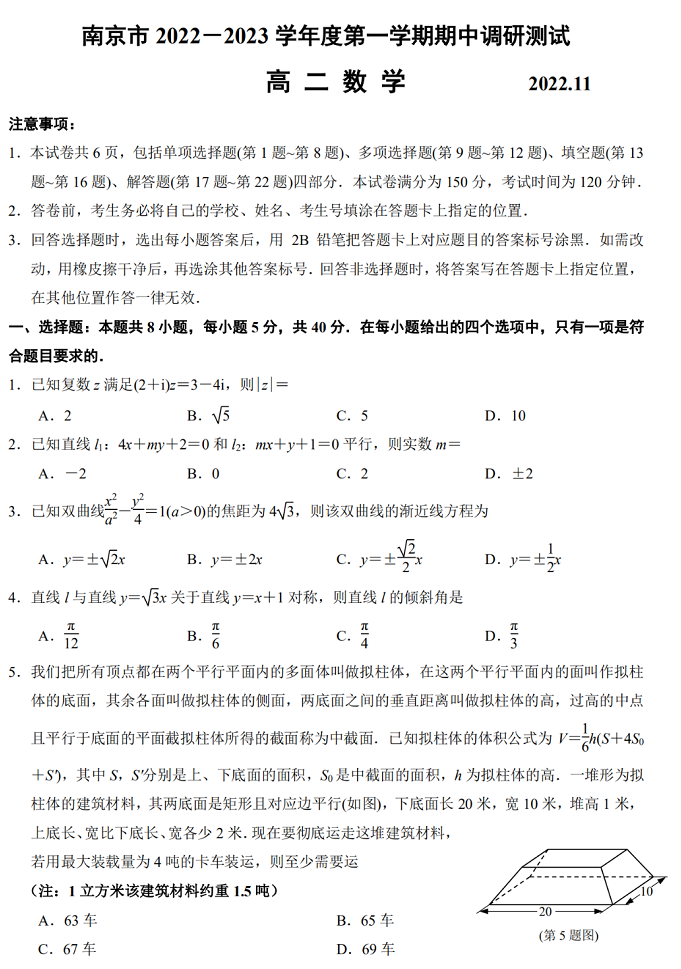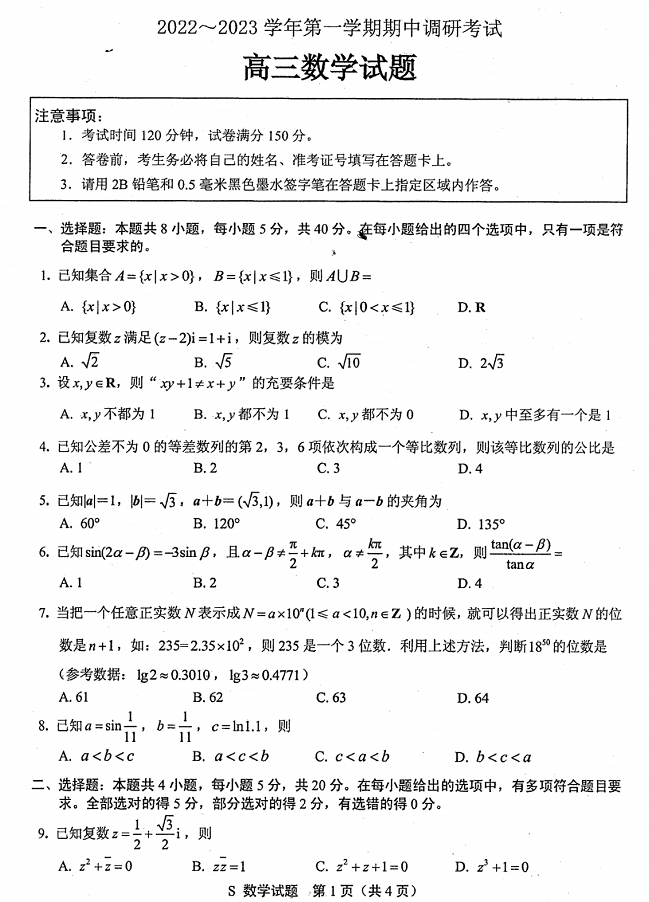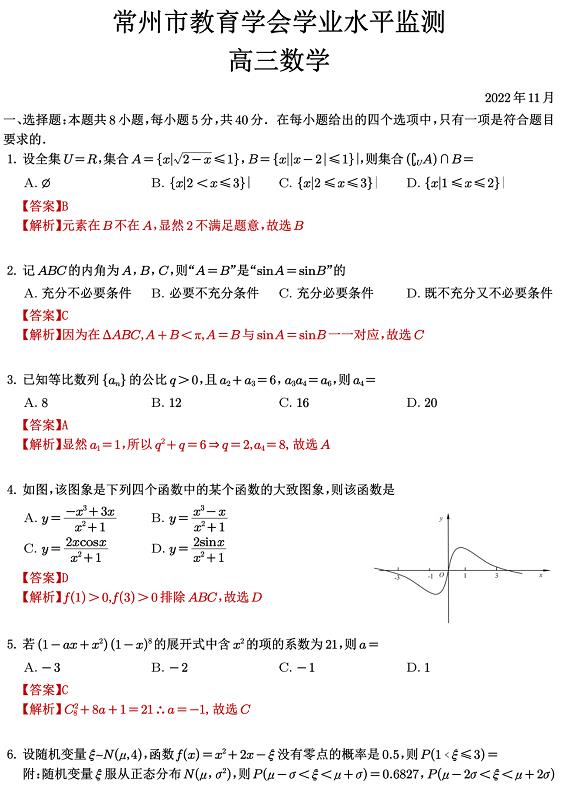近期,各地2020届的高三学生们都在陆陆续续的进行着高三的第一次模考。湖南省永州市的高三一模考试刚刚结束不久,每年我们都会说一模考试在高三来说是较较重要的,那么这次永州市高三一模考试的重要性肯定就不说了,下面是永州市高三一模的英语试卷及答案,各位看一下,你们觉得哪一些题目出的你不会。

永州市2020年次模拟考试试卷英 语
注意事项:
1. 答卷前,考生务必将自己的姓名、考生号填写在答题卡和试卷指定位置上。
2. 回答选择题时,选出每小题答案后,用铅笔把答题卡上对应题目的答案标号涂黑。如需改动,用橡皮擦干净后,再选涂其他答案标号,回答非选择题时,将答案写在答题卡上。
3.考试结束后,将本试卷和答题卡一并交回。
第一部分 听力(共两节,30分)
做题时,先将答案标在试卷上。录音内容结束后,你将有两分钟的时间将试卷上的答案转涂到答题卡上。
第一节(共5小题;每小题1.5分,7.5分)
听下面5段对话。每段对话后有一个小题,从题中所给的A、B、C三个选项中选出较佳选项。听完每段对话后,你都有10秒钟的时间来回答有关小题和阅读下一小题,每段对话仅读一遍。
例:How much is the shirt?
A. £19.15. B. £9.18. C. £9.15.
答案是C。
1. What does the man want to do?
A. Watch films. B. Visit his brother. C. Dine with the woman.
2. How does the woman feel?
A. Happy. B. Dissatisfied. C.Angry.
3. When does the man plan to reach the airport?
A. At 2:00 B. At 2:30 C. At 4:30
4. Why does the man talk to Dr. Simpson?
A. To ask for help. B. To discuss his studies. C. To make an apology.
5. What’s the probable relationship between the speakers?
A. Husband and wife. B. Salesman and customer. C. Interviewer and interviewee.
第二节 (共15小题;每小题1.5分,22.5分)
听下面5段对话或独白。每段对话或独白后有几个小题,从题中所给的A、B、C三个选项中选出较佳选项。听每段对话或独白前,你将有时间阅读各个小题,每小题5秒钟;听完后,各小题将给出5秒钟的作答时间。每段对话或独白读两遍。
听第6段材料,回答第6、7题。
6. What is the conversation mainly about?
A. Weekend plans. B. Phone usage. C. Social apps.
7. How many people does the man usually text?
A. 5. B. 6. C. 60.
听第7段材料,回答第8至10题。
8. What does the woman plan to do?
A. Rent an apartment. B. Have a business meeting. C. Meet her wedding organizer.
9. How much time will the woman be late for her appointment?
A. At least Five minutes. B. At least ten minutes. C. At least fifteen minutes.
10. Where is the woman now?
A. On Reindeer Way. B. In an apartment. C. At a police station.
听第8段材料,回答第11至13题。
11. What will the woman do?
A. See a doctor. B. Post some letters. C. Withdraw some money.
12. Where is the doctor’s office?
A. Near the bank. B. Near the post office. C. Near the supermarket.
13. What is the woman happy about?
A. Finishing some tasks. B. Going downtown. C. Hanging out with the man.
听第9段材料,回答第14至17题。
14. Why did the man arrive late?
A. He got stuck in traffic.
B. He was unable to park.
C. He had to take a different route.
15. What was the weather like in the morning?
A. It was raining. B. It was sunny. C. It was cloudy.
16. What event did the man miss?
A. A sports event. B. A food fair. C. A concert.
17. Where will the dancing events happen?
A. At a park. B. At a stadium. C. At a television station.
听第10段材料,回答第18至20题。
18. What is the main purpose of the loud noises?
A. To warn people outdoors to get inside.
B. To get people’s attention inside their homes.
C. To inform people without radios about danger.
19. Who decides to turn on the system?
A. Local media. B. Local officials. C. The national weather service.
20. What is the main topic of the talk?
A. A weather report.
B. A warning system.
C. The safety measures in bad weather.
第二部分 阅读理解(共两节,40分)
第一节(共15小题;每小题2分,30分)
阅读下列短文,从每题所给的A、B、C和D四个选项中,选出较佳选项。
A
You can either travel or read, but either your body or soul must be on the way. The popular saying has inspired many people to read or go sightseeing. Traveling just like reading, is a refreshing journey from the busy world. Books, brain food, can keep you company on your travel.
On the Road, 1957, by Jack Kerouac
The book is a globally popular spiritual guide book about youth. The main character in the book drives across the US continent with several young people and finally reaches Mexico. After the exhausting and exciting trip, the characters in the book begin to realize the meaning of life. The book can be a good partner with you to explore the United States.
Life is Elsewhere, 1975, by Milan Kundera
Jean-Jacques Rousseau once said, “Man is born free, and everywhere he is in chains.” The book tells a young artist’s romantic but miserable life, about how he reads, dreams, and has a relationship. Experience the artist’s passionate life in the book during a trip to Central Europe. The book invites you to deeply reflect on your current life.
The Stories of Sahara, 1967, by Sanmao
The book narrates the author’s simple but adventurous life in the Sahara Desert, which seems a desolate and dull place. The fancy natural scenery and life there, along with the author’s romantic and intensive emotion, will inspire you to explore the mysterious land. Reading the book is like participating in a dialogue with the author, who is sincere and humorous.
Lotus, 2006 by Annbaby
This novel set in Tibet, tells three people’s stories, each with their unique characteristics. It reveals modern people’s emotions and inner life, their confusion about love, and exploration of Buddhism.The book is a good partner to bring you to the sacred land Tibet.
21. Which book is about the exploration of life value through a journey?
A. On the Road. B. Life is Elsewhere.
C. The Stories of Sahara. D. Lotus.
22. Whose book could be the most suitable for your trip to Germany?
A. Jack Kerouac’s. B. Sanmao’s. C. Annbaby’s. D. Milan Kundera’s.
23. What can we learn from the text?
A. Lotus is a religious book exploring Tibetan Buddhist culture.
B. On the road advises a classic route for driving across the US.
C. The stories of Sahara records its authors’ own life in the desert.
D. Life is Elsewhere demonstrates Jean-Jacques Rousseau’s own life.
B
The great-grandmother is learning English with the help of her family when she is at the age of 91. She hopes to use the language at next year’s Olympic Games in Tokyo. Takamizawa was one of the more than 200, 00 people who requested to volunteer for Tokyo’s 2020 Games. English is not required for service, but it is a useful skill for volunteers to have.
But Takamizawa had not been able to learn the language when she was young. Takamizawa said that she was in high school when World War Two started. She said, “In my second year there, English was banned because it was the enemy language.”
#p#副标题#e#
永州一模,湖南省永州市2020届高三第一次模拟考试英语试卷及答案
Takamizawa said her grandchildren helped persuade her that she was not too old to learn. “When I talked to my grandchildren about my wish, they said, ‘It’s not too late. We will teach you one word a day’ ”. Natsuko is Takamizawa’s granddaughter and main English teacher. Natsuko sends a new English word to her grandmother’s phone every day. They also often work together directly on phrases that Takamizawa will need for the Olympics. “Welcome to Tokyo, this is the Olympic stadium, how can I help you?” Takamizawa answers when asked to say an English phrase she has learned. Natsuko explains that she wanted to give her grandmother something to enjoy. “I can clearly see her English is getting better. It’s my joy now.”
The EF English Proficiency Index is a measure of the level of English spoken in a country. Japan ranks 49th among countries where English is not the first language. This situation is slowly changing as younger generations welcome English. However, Takamizawa believes real change will not happen unless Japanese people become more open to the rest of the world. With around 500 days to go until the games begin, the whole Takamizawa family is ready to welcome the world to Tokyo.
24. Why couldn’t Takamizawa learn English when she was young?
A. Because English was useless.
B. Because she was too young to learn English.
C. Because English was forbidden to learn.
D. Because she was unwilling to learn English.
25. What can we know from the third paragraph?
A. Takamizawa gets strong support from her family.
B. Takamizawa’s grandchildren love her a lot.
C. Natsuko is Takamizawa’s granddaughter and only English teacher.
D. Natsuko teaches Takamizawa English mainly by talking with her.
26. What does the underlined phrase “This situation” in Paragraph 4 refer to?
A. English is not the first language in Japan.
B. The level of English spoken in Japan is relatively low.
C. Younger generations in Japan welcome English.
D. Japanese people become open to the rest of the world.
27. What is the main idea of the passage?
A. Where there is a will, there is a way. B. It is never too late to learn.
C. The early bird catches the worm. D. Two heads are better than one.
C
Move over, helicopter parents. “Snowplow (扫雪机) parents” are the newest reflection of an intensive (强化的) parenting style that can include parents booking their adult children haircuts, texting their college kids to wake them up so they don’t sleep through a test, and even calling their kids’ employers.
Helicopter parenting, the practice of wandering anxiously near one’s children, monitoring their every activity, is so 20th century. Some rich mothers and fathers now are more like snowplows: machines moving ahead, clearing any difficulties in their children’s path to success, so they don’t have to suffer failure, frustration (挫折) or lose opportunities.
It starts early, when parents get on wait lists for excellent preschools before their babies are born and try to make sure their kids never do anything that may frustrate them. It gets more intense when school starts: running forgotten homework to school or calling a coach to request that their children make the team.
Rich parents may have more time and money to devote to making sure their children don’t ever meet with failure, but it’s not only rich parents practicing snowplow parenting. This intensive parenting has become the most welcome way to raise children, regardless of income, education, or race.
Yes, it’s a parent’s job to support the children, and to use their adult wisdom to prepare for the future when their children aren’t mature enough to do so. That’s why parents hide certain toys from babies to avoid getting angry or take away a teenager’s car keys until he finishes his college applications.
But snowplow parents can take it too far, some experts say. If children have never faced a difficulty, what happens when they get into the real world?
“Solving problems, taking risks and overcoming frustration are key life skills,” many child development experts say, “and if parents don’t let their children experience failure, the children don’t acquire them.”
28. What do we know about snowplow parenting?
A. It appeared before helicopter parenting.
B. It costs parents less than helicopter parenting.
C. It was a typical phenomenon of the 20th century.
D. It provides more than enough services for children.
29. What is mainly discussed about snowplow parenting in Paragraph 4?
A. Its cost. B. Its benefits. C. Its popularity. D. Its ending.
30. Why does the author mention parents’ taking away car keys?
A. To show teenagers are no better than babies.
B. To advise teenagers not to treat their cars as toys.
C. To advise parents not to buy cars for their teenagers.
D. To show it’s appropriate to help children when necessary.
31. What’s the possible result of snowplow parenting according to the experts?
A. Children lacking problem-solving ability in reality.
B. Children mastering more key life skills than parents.
C. Children gaining great success in every aspect of life.
D. Children meeting no problems or frustration after growing up.
D
A robot created by Washington State University (WSU) scientists could help elderly people with dementia (痴呆) and other limitations live independently in their own homes.
The Robot Activity Support System, or RAS, uses sensors installed in a WSU smart home to determine where its residents are, what they are doing and when they need assistance with daily activities. It navigates (定位) through rooms and around obstacles to find people on its own, provides video instructions on how to do simple tasks and can even lead its owner to objects like their medication or a snack in the kitchen.
“RAS combines the convenience of a mobile robot with the activity detection technology of a WSU smart home to provide assistance in the moment, as the need for help is detected,” said Bryan Minor, a postdoctoral researcher in the WSU School of Electrical Engineering and Computer Science.
Currently, an estimated 50 percent of adults over the age of 85 need assistance with every day activities such as preparing meals and taking medication and the annual cost for this assistance in the US is nearly $2 trillion. With the number of adults over 85 expected to triple by 2050, researchers hope that technologies like RAS and the WSU smart home will relieve some of the financial strain on the healthcare system by making it easier for older adults to live alone.
RAS is the first robot researchers have tried to incorporate into their smart home environment. They recently published a study in the journal Cognitive Systems Research that demonstrates how RAS could make life easier for older adults struggling to live independently.
“While we are still in an early stage of development, our initial results with RAS have been promising,” Minor said. “The next step in the research will be to test RAS’ performance with a group of older adults to get a better idea of what prompts, video reminders and other preferences they have regarding the robot.”
32. How does RAS serve elderly people?
A. Through sensors. B. Through objects.
C. Through a mobile robot. D. Through their daily activities.
33. What can we know about RAS?
A. It is the first robot used in daily life. B. Its function remains to be tested.
C. It can locate people and do any task. D. It can cook for owners on its own.
34. What’s Minor’s attitude toward the future of RAS?
A. Doubtful. B Negative. C. Optimistic. D. Uncertain.
35. What can be a suitable title for the text?
A. Elderly people leave the nursing home.
B. Smart Home Tests first elder-Care robot.
C. RAS, the first robot to make home smart.
D. Older adults have benefited from RAS.
第二节(共5小题;每小题2分,10分)
根据短文内容,从短文后的选项中选出能填入空白处的较佳选项。选项中有两项为多余选项。
Our world is more connected than ever before thanks to technology. 36 Indeed, it is becoming increasingly important that we all learn how to deal with this painful feeling.
You should be determined to actively end your loneliness. We often end up passively waiting for someone else to make us feel less lonely. You may feel that your loneliness indicates that nobody is willing to connect with you. And there is nothing you can do about it. But that is far from the truth. 37 .
You should find reasons why you are lonely. We all feel lonely for different reasons. Some of us have no one to interact with on a consistent basis and that’s why we feel lonely. You may feel that the people in your life don’t share your thoughts and ideas. 38 you need to identify it. And you know exactly how to handle your loneliness.
39 People who are lonely tend to fall into destructive mental habits. They try to avoid the pain of not being understood and being disconnected by not giving people an opportunity to understand and connect with them. So the solution is to share your thoughts and feelings with others and to do so openly and fearlessly.
You should find people who share your interests. 40 everybody is interested in something. And just as there are many interests, there are many people who share those interests. Find what interests you and connect with others on that basis.
A. Whatever the reason is,
B. When you feel really lonely,
C. If you want to make friends with them,
D. Whether it’s coin collecting or video games,
E. You should be open about your thoughts, ideas and desires.
F. Ending loneliness is something that you can and should pursue actively.
G. However, more and more of us find ourselves having to stand loneliness.
第三部分 英语知识运用(共两节,45分)
第一节 完形填空(共20小题;每小题1.5分,30分)
阅读下面短文,从短文后各题所给的A、B、C和D四个选项中,选出可以填入空白处的较佳选项。
Donald lived in three different foster homes and changed schools with each move. The experience left him 41 and often dropping out of school, making Donald lose all 42 for school. Then he 43 Mr. Felipe, the CIS site coordinator (协调员) at his school.
Mr. Felipe 44 developed a plan to meet Donald’s needs. He 45 school supplies and clothes for Donald and encouraged him to join the schools karate (空手道) program. After months of working with Mr. Felipe, Donald’s 46 changed. He became more 47 and optimistic. He 48 making friends at school and building 49 with his teachers and classmates. Meanwhile, his grades 50 as well.
“My mom has 51 that my attitude has changed a lot, and my grades are much better too. I like to come to the CIS classroom because it is 52 to be here. Mr. Felipe gives us snacks and provides school supplies for us. We work in the garden and we get the 53 we need to study and do our homework. I feel happy and motivated when I come to this 54 .”
For Donald, Mr. Felipe is the person who changed his life. “I was in foster care when I was 4-5 years old and was 55 from my brother for part of the time. I’m back with my family now and happy to have them in my 56 ,” said Donald. “But I still 57 that time and the bad depression I felt. At school, art and football helped me forget and let it all 58 . It is Mr. Felipe who helped me when I was 59 . Because of him I became more serious about 60 .
and work in general. ”
41. A. curious B. depressed C. satisfied D. innocent
42. A. reason B. chance C. confidence D. motivation
43. A. met B. found C. led D. urged
44. A. suddenly B. immediately C. strangely D. actually
45. A. mentioned B. tried C. purchased D. reserved
46. A. attitude B. study C. ambition D. future
47. A. ambitious B. generous C. flexible D. outgoing
48. A. missed B. continued C. resisted D. began
49. A. networks B. targets C. relationships D. trends
50. A. shrank B. changed C. improved D. erupted
51. A. noticed B. argued C. claimed D. hoped
52. A. outstanding B. fun C. challenging D. bearable
53. A. tool B. help C. money D. love
54. A. program B. design C. experiment D. research
55. A. put away B. knocked off C. split up D. turned down
56. A. profession B. life C. emotion D. experience
57. A. treasure B. manage C. keep D. remember
58. A. go B. heal C. flow D. tolerate
59. A. angry B. concerned C. upset D. ambiguous
60. A. hobbies B. relaxation C. sports D. school
第二节 (共10小题;每小题1.5分,15分)
阅读下面短文,在空白处填入1个适当的单词或括号内单词的正确形式。
Mochi (年糕) is a traditional food popular in Chinese and Japanese cooking, made from
61 (special) treated rice. It is often presented in the form of a round cake, and is traditionally exchanged at the New Year.
Mochi is made by 62 (put) sticky rice into water overnight, cooking it and pounding it into a sticky paste. The paste is made into shapes ranging from simple to complex rounds, some of 63 are stuffed with sweet fillings. Mochi is often decorated with 64 (flower) or fruits, especially when it is exchanged as 65 gift at celebrations like birthdays and the New Year.
Traditionally, wooden mortars (臼) and pestles (杵) 66 (use) to pound mochi rice. Fresh mochi is usually cooked and served warm 67 a variety of sauces. Steaming and boiling are both popular preparations in Japan, along with cooking. Fresh mochi is soft but it
68 (hard) quickly. Prepacked mochi blocks, flattened and cut into square pieces or shaped into rounds, are available at grocery stores. Mochi can go bad easily, so it’s 69 (good) to cook soon than to keep it in your fridge.
Hard mochi pieces can be cooked, deep-fried, boiled, and more. Cooked mochi is very sticky, so be careful not 70 (choke) on it.
第四部分 写作(共两节,35分)
第一节 短文改错(共10小题;每小题1分,10分)
假定英语课上老师要求同桌之间交换修改作文,请你修改你同桌写的以下作文。文中共有10处语言错误,每句中较多有两处。每处错误仅涉及一个单词的增加、删除或修改。
增加:在缺词处加一个漏字符号(∧),并在其下面写出该加的词。
删除:把多余的词用斜线(\)划掉。
修改:在错的词下划一横线,并在该词下面写出修改后的词。
注意:1. 每处错误及其修改均仅限一词;
2.只允许修改10处,多者(从第11处起)不计分。
Hello, Jack! I need your help. I am going to organizing a money-raising project for poor students. However, I am at a loss about what to start. I don’t know what type of people was most likely to donate. Is it a good idea to visit to local business people? Besides, what is best way to let the public know your ideas? Last but not least, how can I guarantee that the raising money will be sent to the students who really needs it? Considering that you have much experience in organizing similarly projects, I am wondering whether you could give me some suggestion.
第二节 书面表达(25分)
假定你是李华,你的新西兰朋友 Reef要来你校参加 “中国文化周” 活动,写信向你询问具体细节。请你给他回信,内容如下:
1.表示欢迎;
2.活动时间、地点;
3.活动内容 (听讲座、学汉语、唱京剧等)。
注意:
1. 词数100左右;
2. 可适当增加细节,以使行文连贯。
永州市2020年次模拟考试
英语听力朗读材料、参考答案及评分标准
一、听力朗读材料
这是永州市2020年次模拟考试英语科听力部分。该部分分为第一和第二两节。注意:回答听力部分时,请先将答案标在试卷上。听力部分结束前,你将有两分钟的时间,将你的答案转涂到答题卡上。
现在是听力试音时间。(请插入卷高考英语试音部分音频)。试音到此结束。听力考试正式开始。请看听力部分第一节。
第一节 听下面5段对话,每段对话后有一个小题,从题中所给的A、B、C三个选项中选出较佳选项,并标在试卷的相应位置。听完每段对话后,你都有10秒钟的时间来回答有关小题和阅读下一小题。每段对话仅读一遍。
例如,现在你有5秒钟的时间看试卷上的例题。你将听到以下内容:
M: Excuse me! Can you tell me how much the shirt is?
W: Yes, it’s £9.15.
你有5秒钟的时间将正确答案标在试卷上。衬衫的价格为9镑15便士,所以你选择C项,并将其标在试卷上。
现在你有5秒钟的时间阅读第一小题的有关内容。
Text 1
M: Would you like to go to the movies with Lois and me on Friday?
W: I wish I could, but I’ am having dinner at my brother’s house.
Text 2
W:I’m busy year in and year out, but now I’ve done nothing.
M:You’ve done a lot, my darling!
Text 3
W: What time do you have to leave for the airport?
M: The security is pretty tight so I should get there early. I plan on arriving there 2 hours before my flight leaves. The flight takes off at 4:30, so…
Text 4
M: I’m sorry I was late for class today, Dr. Simpson.
W: Well, I’ll let it go this time. But you saw it disturbed the rest of the class.
M: Yes, I realized that. I won’t let it happen again.
Text 5
M: Just the pants and the blouse? I can always grab you a few different sizes if you would like.
W: It would be great if you can get me the pants in a smaller size. And I’ve already tried on the blouse. It’s perfect for my afternoon interview.
M: Don’t worry, honey! The weather reporter says the temperature will increase 10 degrees tomorrow. A coat won’t be necessary.
第一节到此结束。
第二节 听下面5段对话或独白。每段对话或独白后有几个小题,从题中所给的A、B、C三个选项中选出较佳选项,并标在试卷的相应位置。听每段对话或独白前,你将有时间阅读各个小题,每小题5秒钟;听完后,各小题将给出5秒钟的作答时间。每段对话或独白读两遍。
听下面一段对话,回答第6和第7题两个小题。现在,你有10秒钟的时间阅读这两个小题。
Text 6
M: Will you plug this in… Oh, wait a second…let me just look at this message.
W: You’re always looking at messages on your phone! How many messaging apps do you have, David?
M: Four? Five? Maybe six by now…
W: If you have an average of 10 people on each of those six social networks who send you messages every day, that’s at least 60 conversations! Let’s say you spend as little as one minute on each conversation… That’s a whole hour! But you would probably spend two or three times that much for each person… What a waste of time!
M: Calm down, Maggie. It’s my mother. We’re making plans for the weekend. She’s one of the five people I regularly text.
听下面一段对话,回答第8至第10三个小题。现在你有15秒钟的时间阅读这三个小题。
Text 7
W: Excuse me, sir. This is 2247 Reindeer Way, right?
M: Yes, it is. Are you looking to rent the apartment?
W: I’m here to meet Joy Wang. She is my wedding planner. Have I come to the right place?
M: The address is correct, but there is no one here by that name. The only business here is the print shop on the second floor.
W: I must have gotten the numbers mixed up.
M: Well you can’t be too far. You’re on Reindeer Way. There is a police station just up the road a bit. They will be able to direct you.
W: How far away is it? I’m already ten minutes late for my appointment.
M: It’s two blocks up, on this side of the street. It should take you five minutes.
听下面一段对话,回答第11至第13三个小题。现在,你有15秒钟的时间阅读这三个小题。
Text 8
W: I need to do some things around town today. Would you like to go with me?
M: Sure. I don’t have anything else to do today. What are we going to do?
W: Well... I need to go to the bank and put some money into my bank account. Then I need to stop by the post office and mail some letters. Finally, I need to go shopping at the supermarket for a few things.
M: Okay. I can help you with all of that. Can we also go to the doctor’s office? I need to pick up my medicine.
W: No problem. The doctor’s office is just five minutes’ walk from the post office. Maybe we can also stop and eat lunch together at a restaurant downtown. There’s a new Mexican restaurant that I think you would like.
M: That sounds great! I’m happy to be able to spend the day with you. And I love going downtown no matter what we do.
W: Thanks. I’m just happy to be able to cross a few things off my to-do list.
听下面一段对话,回答第14至第17四个小题。现在,你有20秒钟的时间阅读这四个小题。
Text 9
M: Hey, Alice. I’m sorry I am late.
W: Don’t worry about it. Did you have trouble finding a spot to park?
M: Actually, that wasn’t the problem. I left early enough to avoid the traffic, but I couldn’t get across the bridge.
W: What’s happening on the bridge?
M: I couldn’t tell. I just saw the road signs, so I turned around and took the long way here.
W: Well, it looks like we missed the worst of the weather. It was pouring this morning.
M: That’s good. I can see the sky is clearing up and the wind has stopped. What are those tents for?
W: They’re for the food fair. It will close soon, so you’d better get over there if you want to eat. Unfortunately, you came a bit late for the music.
M: So what is this event all about, anyway?
W: It’s just a community festival we have every year. All the food, entertainment and activities represent the many cultures in our city.
M: Cool. What’s happening across the street at the stadium? I saw that the local TV stations are all set up there.
W: That’s where all the dancing and sports events will take place. This area is for families. I saved us this spot on the grass here.
M: That sounds fun. I’ll go grab something at the tents, and then meet you back here.
听下面一段独白,回答第18至第20三个小题。现在你有15秒钟的时间阅读这三个小题。
Text 10
W: Thank you for attending this public hearing on our new Severe Weather Warning System. I’m Helen Dunley. First, I’d like to remind everyone that the main purpose of a weather warning system is to tell people outdoors to move inside. Now, it’s important to remember that we will test the system every Saturday at noon, so don’t worry about the noise at that time. It’s a good idea to go outside and listen when we test the system and make sure you can hear them in your neighborhood. Remember that the loud noise is only one part of the warning system. The loud noises are started by city officials after we receive warnings from the national weather service. In other words, you might hear a warning on the national news before you hear a warning here. If you do hear one, what should you do? First, take cover. Our city doesn’t have public shelters, so go to the inside of any building, away from windows. Second, wait for reports on local media. Finally, stay indoors until you hear the all-clear signal.
第二节到此结束。现在你有两分钟的时间将试卷上的答案转涂到答题卡上。
(两分钟后)听力部分到此结束。
二、参考答案
第一部分 听力
1-10 ABBCA CACCA 11-20 BBACA CBABB
第二部分 阅读理解
21-23 ADC 24-27 CABB 28-31 DCDA 32-35 ABCB 36-40 GFAED
第三部分 知识与运用
第一节 完型填空
41-45 BDABC 46-50 ADDCC 51-55 ABBAC 56-60 BDACD
第二节 语法填空
61. specially 62. putting 63. which 64. flowers 65. a
66. are used 67. with 68. hardens 69. better 70. to choke
第四部分
第一节 短文改错

第二节 书面表达 (One possible version)
Dear Reef,
I’m more than delighted to know that you are coming to our school to take part in the Chinese Culture Week, which will be held in the students’ center from June 5 to June 12.
There will be a variety of activities during that week. You will listen to several lectures about Chinese culture and have a chance to learn Chinese, which will help you to better understand Chinese culture and make your stay in China easier. Some other activities are also included, such as learning to sing Peking opera and cooking Chinese food, through which you will have a first-hand experience of Chinese culture.
I’m sure you will like it and have an unforgettable visit. Looking forward to your arrival.
Yours,
Li Hua
三、写作评分标准
分档 标准
极优22-24 书写规范;覆盖要点,内容充实;词汇丰富;有修辞意识。
19-21 紧扣主题;覆盖要点,内容充实;语法结构多样,词汇丰富,显示出较强的语言运用能力。语言小错(拼写,标点,用词等)不过6个。
良好16-18 紧扣主题;覆盖要点,内容较充实,语言有少量错误,但基本不影响意思表达。
一般12-15 紧扣主题;基本覆盖要点,能够表达基本内容;语言错误已影响了部分意思的表达,但多数句子基本上正确。
较差8-11 内容不完整,要点不全,行文不连贯;语言错误(尤其是大错)较多,多数句子基本正确。
差4-7 内容混乱或主要内容偏离主题,能够写出少数与内容相关的可读句子。
极差0-3 只写出与内容相关的词语,没有有效信息;抄写其他文章或只写出与作文无关的内容。
更多永州市2020届高三一模试卷及答案请联系我们的老师获取,模考其实要跟对待高考一样,全力以赴,这样等到了高考的时候才会更加的应对如流。
- 热门课程
- 热门资讯
- 热门资料
- 热门福利
-
 大学专业温馨提示:“特不适合男生”的6大专业指的哪些?在选择大学专业时,男生和女生往往因性别特点、兴趣爱好以及未来职业规划等因素而有所倾向。有些专业因其独特的学科属性和未来就业方向,可能更适合某一性别的学生。今天,我们就来聊聊那些被普遍认为“特不适合男生”的六大专业。这并非是对男生的否定或歧视,而是基于实际情况的温馨提示,希望男生们在选择专业时能够
大学专业温馨提示:“特不适合男生”的6大专业指的哪些?在选择大学专业时,男生和女生往往因性别特点、兴趣爱好以及未来职业规划等因素而有所倾向。有些专业因其独特的学科属性和未来就业方向,可能更适合某一性别的学生。今天,我们就来聊聊那些被普遍认为“特不适合男生”的六大专业。这并非是对男生的否定或歧视,而是基于实际情况的温馨提示,希望男生们在选择专业时能够 -
 三个常用的高分议论文构思,议论文高分写作分享在议论文的写作中,构思如同指南针,指引着我们前进的方向。想要获得高分,除了扎实的学识,还需掌握一定的写作技巧。今天,我将为大家分享三个常用的高分议论文构思,希望这些建议能够助你在议论文写作中取得佳绩。 议论文的核心在于通过论证来阐述观点,使读者信服。而一个好的构思,能够使文章结构清晰、逻辑严密
三个常用的高分议论文构思,议论文高分写作分享在议论文的写作中,构思如同指南针,指引着我们前进的方向。想要获得高分,除了扎实的学识,还需掌握一定的写作技巧。今天,我将为大家分享三个常用的高分议论文构思,希望这些建议能够助你在议论文写作中取得佳绩。 议论文的核心在于通过论证来阐述观点,使读者信服。而一个好的构思,能够使文章结构清晰、逻辑严密 -
 杭州上城区哪个辅导机构高三化学教得好?一对一贵不贵?在杭州上城区,众多家长和学生都面临着如何找到优质高三化学辅导机构的难题。毕竟,高三化学知识深奥且复杂,需要经验丰富的老师来指导和点拨。在众多辅导机构中,杭州秦学教育以其出色的教学质量和个性化辅导方式,赢得了家长和学生的广泛赞誉。 一直以来,杭州秦学教育的高三化学辅导课程都备受推崇。他们拥有一批
杭州上城区哪个辅导机构高三化学教得好?一对一贵不贵?在杭州上城区,众多家长和学生都面临着如何找到优质高三化学辅导机构的难题。毕竟,高三化学知识深奥且复杂,需要经验丰富的老师来指导和点拨。在众多辅导机构中,杭州秦学教育以其出色的教学质量和个性化辅导方式,赢得了家长和学生的广泛赞誉。 一直以来,杭州秦学教育的高三化学辅导课程都备受推崇。他们拥有一批 -
 黄河中学附近有没有中考冲刺班?一对一怎么收费?随着中考的临近,学生和家长都希望能够找到一所优质的中考冲刺班,帮助学生在关键时刻取得更好的成绩。那么,在黄河中学附近有没有合适的中考冲刺班?一对一怎么收费呢?本篇文章小编就带领大家一起来了解一下西安黄河中学附近的中考冲刺班。 西安黄河中学附近中考冲刺班推荐: 对于西安黄河中学附近的学生来说,
黄河中学附近有没有中考冲刺班?一对一怎么收费?随着中考的临近,学生和家长都希望能够找到一所优质的中考冲刺班,帮助学生在关键时刻取得更好的成绩。那么,在黄河中学附近有没有合适的中考冲刺班?一对一怎么收费呢?本篇文章小编就带领大家一起来了解一下西安黄河中学附近的中考冲刺班。 西安黄河中学附近中考冲刺班推荐: 对于西安黄河中学附近的学生来说,
-
 南京市2022-2023年高二上学期期中考试数学试卷含答案南京市高二学生进行了2022-2023年第一学期中考试,小编整理到了这次考试的数学试卷及答案,在这篇文章里面分享给同学们。咱们高二学生或者是江苏其他城市的高二学生们也可以看一看、做一做,对自己的知识进行一个复习,对自己做一个检测。 南京市2022-2023年高二上学期期中考试数学试卷
南京市2022-2023年高二上学期期中考试数学试卷含答案南京市高二学生进行了2022-2023年第一学期中考试,小编整理到了这次考试的数学试卷及答案,在这篇文章里面分享给同学们。咱们高二学生或者是江苏其他城市的高二学生们也可以看一看、做一做,对自己的知识进行一个复习,对自己做一个检测。 南京市2022-2023年高二上学期期中考试数学试卷 -
 江苏省连云港市2022-2023年上学期高三期中考试数学试卷及答案近日江苏的很多城市的高三学校都进行了2022-2023年上学期期中考试,主要是对高三学生从开学到现在这么长时间学习情况的一个调查。下面是江苏省连云港市2022-2023年上学期高三期中考试数学试卷及答案,伊顿教育小编整理出来跟大家进行分享。 江苏省连云港市2022-2023年上学期高三
江苏省连云港市2022-2023年上学期高三期中考试数学试卷及答案近日江苏的很多城市的高三学校都进行了2022-2023年上学期期中考试,主要是对高三学生从开学到现在这么长时间学习情况的一个调查。下面是江苏省连云港市2022-2023年上学期高三期中考试数学试卷及答案,伊顿教育小编整理出来跟大家进行分享。 江苏省连云港市2022-2023年上学期高三 -
 常州市2023届高三期中联考数学试卷及答案解析近期江苏省一些城市的高三学生们已经开始了期中考试,下面是小编整理的常州市2023届高三期中联考数学试卷及答案解析,虽然考试已经考完了,但是你们还是可以看再看一下的。另外咱们江苏其他城市的高三学生们也可以做一下常州市今年高三期中联考的数学试卷,看看自己得多少分。 常州市2023届高三期中
常州市2023届高三期中联考数学试卷及答案解析近期江苏省一些城市的高三学生们已经开始了期中考试,下面是小编整理的常州市2023届高三期中联考数学试卷及答案解析,虽然考试已经考完了,但是你们还是可以看再看一下的。另外咱们江苏其他城市的高三学生们也可以做一下常州市今年高三期中联考的数学试卷,看看自己得多少分。 常州市2023届高三期中 -
 2023南京高三零模 南京市2023届高三零模数学试卷及答案解析随着高三开学,南京市迎来了高三零模考试,正式进入高三的模考,这次零模考试不知道广大高三学子们考的怎么样呢?以下是小编为大家整理的2023届南京市高三零模考试的数学试卷及答案解析,欢迎大家来查漏补缺。 2023南京高三零模 南京市2023届高三零模数学试卷及答案解析
2023南京高三零模 南京市2023届高三零模数学试卷及答案解析随着高三开学,南京市迎来了高三零模考试,正式进入高三的模考,这次零模考试不知道广大高三学子们考的怎么样呢?以下是小编为大家整理的2023届南京市高三零模考试的数学试卷及答案解析,欢迎大家来查漏补缺。 2023南京高三零模 南京市2023届高三零模数学试卷及答案解析



















